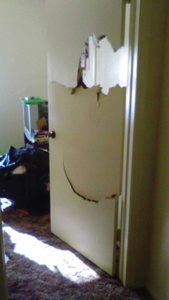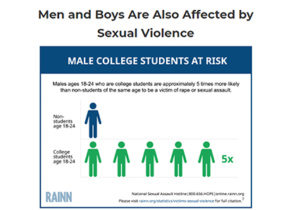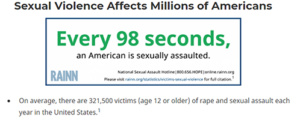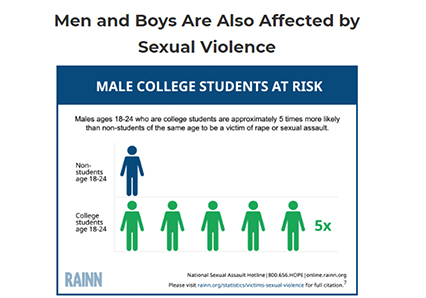By ASHLEY STREHL,
MEGAN MAHARRY,
MONTANA MCCULLOUGH
Love is blind, love is not always kind.
For one young woman, she felt she could help readers understand an abusive relationship. She shared her story of her abusive husband, which affected both her and her son.
Her name for this story is Jane Doe.
In her experience, abuse reached past the point of verbal and emotional.
“He made me feel crazy, like I couldn’t do any better,” Doe said. “He’d push me around, choke me, and smash my head into walls. He called me names, drug me by my hair, and pushed me out of his truck when I was 6 months pregnant.”

Doe felt the need to push herself into uncomfortable situations in order to avoid fights. She found herself giving him money so he could buy drugs. He ignored his duties as a father and a husband. One night, Doe decided that it was time for her to run.
“He took off with me in the car and my son in the house asleep. He left our son home alone, and told me I should have thought about it before I got in the car. We were fighting because I wanted to go to spend his birthday with him but he wanted to drive to his hometown and get high with his friends,” Doe said. “I left that evening.”
Jane Doe found the strength to leave the relationship and since then, her and her son’s life has gotten better.
“I don’t cry every day because of something he has said or done. I don’t have to drive around 2 am trying to find him.” Doe said, “I don’t have to worry about him hurting me or my son, my family is happier. I’m not afraid to leave the house without makeup on, and I’m happier and mentally stronger.”
Domestic violence is defined as violent or aggressive behavior within the home, typically involving the violent abuse of a spouse or partner. It affects many individuals despite their age, race or gender. It is not considered physical abuse only, but emotional, sexual and psychological abuse as well.
Twenty percent of women between the ages of 18-24 who are college students do not report domestic abuse because they fear reprisal. Women are not the only people who are involved in domestic abuse. According to rainn.org, men between the ages of 18-24 who are in college are five times more likely to be sexually assaulted than non-college men in that age range. One out of 10 victims of sexual abuse are males.
Brandy Johnson is the job coordinator and victims advocate for the Northwest Crisis Center. She helps advocate for victims in abusive or sexual assault relationships.

 Johnson said she helps victims with a number of different things. She provides resources, safety and counseling She provides moral support if needed, and she can also stand with them in court.
Johnson said she helps victims with a number of different things. She provides resources, safety and counseling She provides moral support if needed, and she can also stand with them in court.
Johnson said when she is called to a scene, she first assesses the safety of the situation. If there is immediate danger, she may send the victim to an emergency shelter located in Woodward.
One of the steps a victim can take to protect themselves is a protection order. A protection order can help protect a victim from harassment and stalking. Victims can also talk to a judge without their aggressor present with a protection order.
Officer Keith Dale, undersheriff at the Woods County Sheriff’s Office, said that domestic abuse cases are hard to deal with. Sometimes women recant their stories or do not end up testifying against their abuser.
Jennifer Pribble is a professor of social work at NWOSU. Her specialty is working with children and families. She is a licensed clinical social worker, and did therapy for children and families before she was a professor.
She said the main difference between social work and other disciplines is how things are seen.
“We look at things in a person and environment perspective,” Pribble said. “We look at if a person is going to change, the whole environment has to change with them in order to see the benefits of it.”
She said domestic violence cases are different than other social cases because it is a completely different process. She said they have to meet victims where they are at and cannot just tell them to leave. She said domestic violence cases are also much more repetitive than other cases, as victims will go back and forth between leaving and returning to the abuser.
Colorado, Wisconsin and Washington are a few states that have strict domestic violence laws in place. Prosecutors have dealt with many domestic abuse cases that have led to a mistrial because the victim does not want to testify.
“We have to do the best we can with domestic abuse cases,” said Westline Ritter, district attorney of Woods County. “It’s hard when the woman goes back to her abuser and doesn’t want to follow through with the case.”
Elizabeth Gomez has her degree in psychology from the University of California San Diego. She plans to work as an applied behavioral analysis therapist while studying for the Graduate Records Examination.
Gomez said pyscho-social factors can lead to someone being abusive. There are four attachment theories that stem from childhood. Patterns of these attachment styles are often perpetuating with one’s partner.
“It’s difficult to pin point exactly what makes them think it is okay to be abusive, but often it boils down to attachment theories,” Gomez said.
The abuser often does not see anything wrong with the relationship. An abuser is highly manipulative, and very good at hiding, and often times very charming.
Another reason might be that the abuser is imitating behaviors that he/she has seen in the past and has been reinforcing for in the past. Typically, abusive people have abusive parents.
On average, it takes a victim 7-10 times before leaving their abuser permanently. Gomez said the reason victims stay in these relationships also stems back to attachment styles, specifically anxious attachment.
Psychologically, violent relationships can be extremely traumatic especially if victims are constantly being attacked emotionally.
“The abused will try to rationalize the abuser and go as far as to defend him or her from their friends and family, and the abused will believe all of the things that the abuser says about him or her,” Gomez said.
Victims can also suffer from anxiety and post-traumatic stress disorder. There is also a chance the victim will fall into another bad relationship.
After an abusive relationship, a person often will never be the same again. Minnie Mouse, however, was determined to find a silver lining. She was not the same again, but she became happier than she has ever been in her life.
“In the beginning, things were well, I thought that I may have found the one,” Mouse said. “He was very attentive, and caring, but now, I can’t even look at him.”
Mouse had her fair share of fail relationships. Her trust issues were already damaged by previous men if her life.
“You never really realize there are people like this in the world until you date one,” Mouse said. “Out of nowhere, he would randomly flip out on me, he would completely go crazy. It was also always my fault.”
Mouse eventually decided to leave him. She was scared, not knowing how he would react.
“After he slammed that door I knew my new middle name was freedom, it wasn’t easy and I had never had to be braver in my life,” Mouse said. “Ever since then, I have never let anyone treat me the way he did, and I never will. I see the good in people and know whether or not it is genuine. I’m so happy and content with my life.”
Bailey Trammell is the student success and counselor at NWOSU. If a student on campus is struggle with an abusive relationship, they can see Trammell for help and guidance.
Trammell said if a student were to come to her, she would provide multiple resources and the option to file a report.
She said if she were counseling someone in a domestic violence case, she would provide coping skills and instill a safety plan in case the relationship worsened.
“One of the biggest hurdles is building self-esteem in victims who are abused (both mentally and physically),” Trammell said. “These individuals begin to believe that they deserve the abuse and that they cannot find a better life partner. They are also scared to leave out of fear of retaliation.”
If students on campus wanted to start a support group for people in or coming out of abusive relationships, they can do so without permission. Setting designated times to meet is up to the group. Trammell said they could have the option to ask a counselor or victim’s advocate to be a part in these meetings.
“There is always a way out,” said a woman who took the survey. “It might be scary, and it might be hard, but you can leave.

